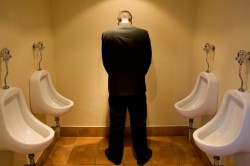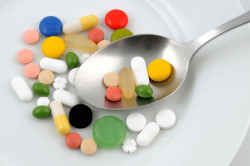Problems with urination can appear at any age in everyone without exception. This may be due to inflammation of the genitourinary system, impaired kidney function, infections, oncology, trauma, etc.
Sometimes difficulties arise with the beginning of the process of excretion of urine, sometimes with the strength of the jet. Sometimes there are pains, cramps. There may be blood streaks in the urine. In men, problems with urination are often accompanied by sexual dysfunction.
While maintaining the normal water balance of the body (consumption of at least 1.5 liters per day), the adult diuresis rate is three-quarters of the total consumption. In the presence of pathologies, diuresis can change both upward (polyuria) and downward (oliguria).
In men, most often difficult urination, or rather its delay, is observed in the morning. Unpleasant symptoms are added to this: the appearance of uncharacteristic discharge, pain, erectile dysfunction, general malaise. To stop the torture, the man delays urine, tries to visit the toilet less often, which only harms his condition.
: what is the reason?
If a man has difficulty urinating in the morning, he will most likely have an inflammatory change in the size of the prostate. This leads to squeezing of the ureter, a decrease in the strength of the jet and a discharge in general. Other causes of difficulty urinating of various etiologies are also called:
- benign and malignant neoplasms;
- infectious irritation of the urinary tract;
- STD;
- multiple sclerosis;
- autoimmune pathologies;
- impaired brain activity (spinal, including);
- chemical irritation of the walls of the ureter;
- trauma to the spine or urinary organs;
- disturbed metabolism;
- urolithiasis disease;
- inflammatory pathologies;
- diseases of a neurological nature;
- orchitis, balanitis, balanoposthitis, epididymitis and other exclusively male disorders.
Read also:
Not only diseases can provoke difficulties with the excretion of urine. Dysfunction should also be considered as a side effect due to the intake of diuretics, stimulants, alcoholism, drug addiction, hypochondria, hysteria.

Men who experience such problems suffer a lot, and not only physically. Their sexual activity decreases, they become quick-tempered, irritable. Decreased efficiency, interest in life as such. Problems, of course, are reflected in others: beloved woman, children, colleagues.
Doctors advise not to delay contacting a doctor for any, even as yet very mild, manifestations of the disorder. Without adequate and timely treatment of difficult urination, a man can overtake more serious problems.
Knowing how men “love” going to the doctors, a woman has to take the initiative into her own hands, insist on visiting a doctor, or even bring them “by the hand”. It is important here that a woman be attentive to her partner, be able to monitor his condition, and understand the problem that has arisen. It is sometimes very difficult to do this, since representatives of the stronger sex do not like to talk about such delicate problems.
You should contact a urologist. The main thing is to correctly diagnose, the nature of the therapeutic technique directly depends on this. In general, treatment is aimed at eliminating symptoms, restoring functions, correcting disorders caused by the underlying disease.
Conservative methods include means, the choice of which determines the nature of the disorder:
- antibiotic therapy;
- drugs that slow down the growth of benign hyperplasia;
- a complex of urological medicines;
- anticholinergic drugs;
- drugs that promote the dissolution, crushing of stones;
- anti-inflammatory drugs;
- physiotherapy;
- warm compresses, body wraps, spa treatments.
Operational interventions:
- crushing or removing stones;
- complete or partial removal of the gland, tumor, adenoma;
- stricture (excision) of the urethra.
In some cases, the patient is placed in a hospital, where treatment is carried out under the supervision of a specialist. At this time, the diet is also being revised, from which alcohol, coffee, and soda are definitely excluded. If a man smokes, then this addiction will have to get rid of. Do not eat fatty, fried foods, salty, spicy, sour, pickled and canned. Make an increase in vegetables (onions and garlic daily), greens, healthy proteins, seafood, cereals and flour products, fruits, dairy products.
Treatment of urinary problems in men with folk remedies

Although alternative medicine can cause some skepticism, there are still remedies that help a lot, and are also recommended by experts as more gentle methods of treatment and effective in prevention. For example, decoctions of rose hips and juniper. However, in the treatment of such a delicate problem, one should not rely only on folk remedies, their improper use can aggravate the situation. Home remedies are used only in combination with traditional treatments, as their main goal is to eliminate or reduce symptoms.
- Walnut. A powder is prepared from the shell, bark or leaves, which should be taken twice a day for 8-9 g (about a tablespoon).
- Juniper berries can be consumed in any form and more.
- Tea rose fruit infusion. Proportions to boiling water 1:2. Let it brew for several days, take 10-12 drops twice a day.
- For 1 liter of dry white wine 30 g of dry birch leaf. Boil for a quarter of an hour. Cool, add 3 tbsp. l. natural honey. Take 70 ml after each meal.
- Warm baths with sea salt and herbs (a third of an hour), after which rest in a warm bed and a warm compress.
- Herbal tea from corn stigmas, St. John's wort, bear ears and other pharmacy fees is recommended if difficulty urinating is caused by kidney dysfunction.
Difficulty urinating in men may indicate the presence of a number of urological diseases. In this case, the following symptoms may be observed:
- excretion of urine in drops, not a stream;
- the jet is sluggish;
- urination with strain;
- prolongation of the act of urine output;
- bifurcated jet or spray.
If such symptoms appear, you should immediately contact a specialist who can diagnose the male body and provide quality treatment.
Causes of difficulty urinating
Difficult urine output in men in medicine is called stranguria, which is a pronounced form of dysuria. Dysuria is a generalized term for any urinary disorders. To understand what is meant by a violation, you should know the rate of urine output.
In urology, the rate of urination is understood as the painless excretion of 1500 ml of urine per day, which is about 75% of the fluid consumed by the body during the same period. At the same time, the number of trips to the toilet should be on average 4-5 times a day and 1 time at night. The average volume of the bladder in a healthy man is 300 ml. In some cases given value can increase, but not to infinity. A healthy person can control the process of urination and restrain it for some time even with a large bladder fullness.
 The causes of stranguria in men are usually inflammatory processes affecting the vulva, bladder, urethra, or prostate gland.. In most cases, the onset of symptoms is associated with urethritis caused by a viral, bacterial protozoal or ureaplasma infection. Non-infectious urethritis can develop due to trauma that can be obtained from aggressive pre-sexual play or excessive masturbation. In men, due to heavy lifting or other physical exertion, reflux of sterile urine into the ejaculatory streams and into the epididymis may occur. These situations can also be causes of non-infectious urethritis, epididymitis, or prostatitis, leading to difficulty urinating.
The causes of stranguria in men are usually inflammatory processes affecting the vulva, bladder, urethra, or prostate gland.. In most cases, the onset of symptoms is associated with urethritis caused by a viral, bacterial protozoal or ureaplasma infection. Non-infectious urethritis can develop due to trauma that can be obtained from aggressive pre-sexual play or excessive masturbation. In men, due to heavy lifting or other physical exertion, reflux of sterile urine into the ejaculatory streams and into the epididymis may occur. These situations can also be causes of non-infectious urethritis, epididymitis, or prostatitis, leading to difficulty urinating.
The cause of stanguria can also lie in urolithiasis, and in the presence of a malignant or benign tumor of the urethra, bladder or prostate gland. Difficulty urinating can be a cause of neuromuscular disease, such as demyelinating neurological disease, as well as diabetes mellitus.
Evaluation and treatment of the symptom of painful emptying of the bladder in men should be accompanied by a complete examination of the urinary system, which can be used to detect the pathology leading to the appearance of this symptom.
Treatment of difficult urination in men
 The quality of life of a man is reduced if the process of urination is difficult. As soon as the first symptoms of this pathology were discovered, in no case should one hesitate, but immediately contact a urologist. Otherwise, you can start the disease, which will make its treatment much more difficult.
The quality of life of a man is reduced if the process of urination is difficult. As soon as the first symptoms of this pathology were discovered, in no case should one hesitate, but immediately contact a urologist. Otherwise, you can start the disease, which will make its treatment much more difficult.
First, specialists diagnose the cause of the problem with urine output. After that, an accurate diagnosis is made and individual treatment is prescribed, aimed not only at eliminating the symptoms, but also at the source of infection. At the first stage of treatment, universal antibiotics can be prescribed in combination with urological drugs.
Widespread use in the treatment received anticholinergic drugs that eliminate spasms of the urethra and bladder. If the cause of difficult urination is prostatitis, then the doctor prescribes a course of antibiotics. If pharmacological preparations have not brought positive results, then the patient is prescribed surgery, which is selected individually for each case.
Treatment with folk remedies
 When obstructed urine output is the cause of a temporary muscle spasm, then treatment can be carried out and folk methods at home. Sometimes irritable sounds help in this case, which can unblock the ureter. It can be the sound of running water from a tap or kettle. However, with frequent cases of difficult urination, it is recommended to take a large number of juniper fruit.
When obstructed urine output is the cause of a temporary muscle spasm, then treatment can be carried out and folk methods at home. Sometimes irritable sounds help in this case, which can unblock the ureter. It can be the sound of running water from a tap or kettle. However, with frequent cases of difficult urination, it is recommended to take a large number of juniper fruit.
An infusion of tea rose fruits copes well with this problem. In this case, the container is half filled with fruits and poured with hot boiled water. After a few days, when the infusion becomes straw-yellow, it is ready for use. It is taken 2 times a day for 10-12 drops.
You can also grind 30 g of dry birch leaves and pour them with 1 liter of boiled dry white wine. Then the mixture is boiled for 15 minutes in a sealed container, after which it cools naturally. Next, add 3 tbsp. spoons of honey and mix. You need to store such a decoction in the refrigerator, and take 1/3 cup 3 times a day after meals.
Men suffering from difficulty urinating are not recommended to drink alcohol, carbonated and caffeinated drinks. Treatment of this pathology is a rather long and difficult process. Therefore, it is easier to prevent the occurrence and development of the disease than to get rid of it.
Problems with urination in men are quite common, and in many cases they are signs of the development of certain diseases. The most common of these problems are difficulty urinating, pain or burning when urinating, and an unusually frequent urge to urinate.
The bladder is a balloon-like organ that shrinks or enlarges depending on the amount of content in it. When about 200-300 ml of urine accumulates in the bladder, its walls are strongly stretched, and in response to this, the nerves located on them send signals through the spinal cord to the brain, resulting in the urge to urinate. However, with some violations in these processes, a failure occurs, which leads to certain problems.
What can cause problems with urination in men
The first thing that many men fear when they have problems with urination is sexually transmitted diseases (STDs). Indeed, diseases of this type often affect the functioning of the urinary system. The most common causes of urinary problems are the following STDs:

Difficulty urinating in men can also be caused by the following reasons:
- Stones in the urinary tract;
- Irritation or inflammation caused by certain activities, such as horseback riding or long bike rides
- Tumor in the urinary tract. These tumors are rare, but they can lead to difficulty urinating or even not urinating;
- An enlarged prostate can also lead to difficulty urinating and/or pain when urinating. The most common cause of this is prostatitis, but sometimes cancerous tumors also lead to enlargement of the prostate;
- Damage to the nerves that carry signals between the bladder and the brain can cause difficulty urinating. One of possible causes of this is spinal cord compression, a disorder in which the patient needs urgent health care, otherwise it can lead to serious health problems;
- Surgical operations in some cases can also lead to impaired urination. Especially often the reasons for this are operations on the prostate gland and bladder;
- Medications. Some medications can cause urinary retention, especially in men with an enlarged prostate. These drugs include ephedrine, pseudoephedrine, and phenylpropanolamine, which can constrict the urethra, as well as some older generation antihistamines and antidepressants;
- Prolonged immobilization, for example due to certain medical conditions, can also cause problems with urination.
Treatment
The way to eliminate urinary problems in men depends on what caused them. For any difficulties with urination, you should consult a doctor as soon as possible - only he can determine what caused them and prescribe the most appropriate method of treatment. Prompt treatment will prevent serious problems with health, and in the case of STDs, to prevent infection of other people.
If a patient is diagnosed with chlamydia, they will be given a course of antibiotics. In most cases, azithromycin (one dose) or doxycycline (two doses per day, for one week) is prescribed for this disease. If the patient is allergic to these drugs, the doctor may prescribe other antibiotics, such as erythromycin or ofloxacin. Men, like women, are advised to abstain from sexual intercourse for at least a week after the end of the course of treatment. It is important that the partner of the man is also treated, otherwise there is a high probability of re-infection.
Side effects of medications used to treat chlamydia can include stomach pain, diarrhea, and nausea.
Antibiotics are also used to treat gonorrhea. As a rule, patients are given one injection of the drug (usually in the buttock or thigh), and are prescribed another dose of antibiotic tablets or capsules. Symptoms of gonorrhea in most cases go away within a few days after taking the medication. Gonorrhea also requires treatment of the patient's sexual partner.
If problems with urination are caused by prostatitis, a thorough examination will be carried out to determine the cause of this disease. When prostatitis is caused by a bacterial infection, antibiotic treatment is prescribed, but quite often it is not possible to determine the cause of the disease, and it can be very difficult to treat it.
Treatment of acute prostatitis  caused by bacteria, in most cases lasts four weeks. Symptoms, including difficulty with urination, disappear, on average, after two weeks, but in no case should you end the course of treatment prematurely - this can cause a relapse. For chronic prostatitis
caused by bacteria, in most cases lasts four weeks. Symptoms, including difficulty with urination, disappear, on average, after two weeks, but in no case should you end the course of treatment prematurely - this can cause a relapse. For chronic prostatitis  the course of treatment can last from four to six weeks. In addition to antibiotics, the patient may be prescribed alpha-blockers, which relax the muscles in the prostate and bladder and make it easier to urinate. Among the possible side effects alpha blockers - dizziness, weakness, headache, decrease in semen volume during ejaculation. After the end of the course of treatment, the patient must be examined to make sure that the infection is really defeated.
the course of treatment can last from four to six weeks. In addition to antibiotics, the patient may be prescribed alpha-blockers, which relax the muscles in the prostate and bladder and make it easier to urinate. Among the possible side effects alpha blockers - dizziness, weakness, headache, decrease in semen volume during ejaculation. After the end of the course of treatment, the patient must be examined to make sure that the infection is really defeated.
Often men, even young ones, experience difficulty urinating. In most cases, the problem appears due to dysfunction of the organs of the genitourinary system. There are various forms of this pathology:
- frequent calls;
- urine output in an irregular stream (forked or interrupted);
- small single portions of urine;
- discomfort during urination, etc.
After detecting such signs, you should immediately contact a urologist.
The reasons
The cause of the disease is most often inflammation of the prostate gland or its benign hypertrophy. Difficulty urinating in men appears as a result of an increase in the size of the prostate, which presses the urethra and closes its lumen. A similar situation occurs in women during pregnancy, when the ureter is clamped by an enlarged uterus.
There are also other causes of the disease:
- infections in the lower urinary tract;
- diabetes;
- prostate cancer;
- disorders in the work of the spinal cord and brain;
- irritation of the walls of the urinary canal with chemicals;
- syphilis;
- metabolic disease;
- lack of neural connection with the bladder, which is lost due to spinal disease or injury;
- multiple sclerosis.
Poor urination in the morning
Usually, men face the problem of urinary retention in the morning, after waking up, and other symptoms also occur at the same time:
- general malaise;
- erectile dysfunction;
- discharge from the penis.
When such signs appear in the morning, it is likely that problems with urination in men have arisen due to prostatitis, an inflammatory process of prostate tissue. Such a disease threatens as a result of infection after unprotected sexual intercourse. Also, prostatitis can occur due to injuries of the pelvic organs, lack of physical activity, violations of hormonal balance and blood circulation, constant hypothermia. With this diagnosis, a man, in addition to urination disorders in the morning, also has other symptoms:
- weakened immunity;
- violation of blood circulation in the organs of the genitourinary system;
- pain when emptying the bladder;
- sexual disorders;
- dysuria.
Treatment
When the first signs of urinary retention appear, you should immediately consult a urologist. The sooner treatment is started, the more likely it is to be successful, and unpleasant consequences can be avoided.
Previously, doctors conduct a complete examination of the body in order to accurately diagnose and determine what caused the disease. After identifying the cause, which resulted in problems with urination, treatment is prescribed according to an individual scheme. It is aimed at alleviating the painful and uncomfortable symptoms of the disease and eliminating its pathogen.
If the cause is prostatitis, then the doctor must prescribe broad-spectrum antibiotics along with urological drugs.
Often in the treatment of urination disorders in men, anticholinergic drugs are used, such as Probantin, Oxybutynin (Driptan), etc. With the help of these drugs, spasms of the urethra and bladder are eliminated.
If after completing the course drug treatment problems with urination will still bother the man, then the doctor may decide to conduct surgical operation. The technique of surgical intervention is individual for each patient, depending on the characteristics of his body and the course of the disease.
If the cause of difficulty urinating in men is kidney disease, then the patient is hospitalized and prescribed a course of drug therapy aimed at restoring the work of these organs.
Doctors recommend that men who suffer from a violation of the outflow of urine stop drinking carbonated, alcoholic and caffeinated drinks. You should also avoid taking diuretics or stimulants. If you have trouble passing urine, talk to your doctor about medications you have taken in the past. It is very important to consult a urologist in a timely manner when the first symptoms of the disease appear. This also applies to women during pregnancy, since they also face such a problem.
Treatment with folk remedies
Folk remedies cannot completely cure the disease, due to which urine does not flow well; they only eliminate unpleasant symptoms.
With such problems, it is recommended to include a large amount of juniper berries in the diet. Helps and more folk remedy based walnut. If urine is excreted in drops, the nut shell should be crushed and taken 9 g every day. The powder can also be made from the leaves and bark of this tree. Take 8 g of each type twice a day.
With urethritis, duckweed powder helps well. 1 st. l. Means to drink with warm water half an hour before meals. Repeat three times a day.
Treatment of pathologies of the genitourinary system is very long and difficult. If you ignore the first symptoms, then the disease goes into an advanced stage, the treatment of which will be difficult and time-consuming. Therefore, it is better to prevent the appearance and development of a disease that is very dangerous for men's health than to spend time and money on its elimination.
The weakening of the jet during urination does not apply to the physiological states of the body. Especially if the phenomenon does not last the first day and is accompanied by pain inside the canal, secretions of various volumes and consistency, and an increase in body temperature. Given the probable causes, the urologist deals with the treatment of diseases (in certain clinical cases, with the participation of a neuropathologist).

The weakening of the urine stream most often occurs due to pathologies of the prostate.
A change in the pressure of urine is characteristic of middle-aged and elderly men, which is explained by the functional and hormonal processes of the body. Among young patients, the phenomenon is characteristic of adherents of casual sex, which causes the development of infectious prostatitis in them.
Of decisive importance for the quality of urination in a man is the condition of the prostate. Anatomically, the prostate gland is located around the urethra, so the inflammatory process that has arisen in its tissues can spread to this organ. Most often, a weakening of the pressure of urine occurs due to development. As it progresses, it exerts a pressing effect on the urethra, which significantly narrows its lumen, causing a weak stream during urination.
Weak urine pressure accompanies the following diseases:
- benign and malignant neoplasms of the prostate;
- violations of the metabolic processes of the body: in particular, when the nervous regulation of both the bladder itself and the sphincter that controls the flow of urine is disturbed;
- sclerotic changes in the bladder;
- sexual infections: especially often cause gonorrhea and syphilis;
- violations of the regulatory activity of the brain.
Taking certain groups of medications can also affect the pressure of urine. Therefore, when voicing complaints to a specialist, a man must also inform about all the medicines he takes.
Manifestations of diseases in which the urine stream weakens
To understand the background of the development of which disease has changed the quality of urination, you need to know a brief clinical description of the most common disorders.
Urethral stricture
The disorder is characterized as a narrowing of the internal lumen of the urethra. The replacement of physiological, healthy scar tissue occurs for a number of reasons, the most common of which are:
- previous injuries, burns of the urethra;
- inflammatory processes inside the urethra, bladder, ureters;
- problems with blood circulation inside the tissues of the urinary organs;
- oncological neoplasms, radiation therapy transferred as a result of them;
- unsuccessful surgical interventions of the urological plan.
Urethral stricture is accompanied by spraying of a stream of urine (it can leak involuntarily), the frequency of urges increases, after the process is completed, the man still has the feeling of an incompletely emptied bladder. There is also pain syndrome - an unpleasant sensation occurs in the pelvic region. If the disease has acquired a protracted course or has become severe, we are talking no longer about reducing the intensity of the jet, but about practically total absence pressure - urine is excreted drop by drop. The patient may pay attention to (the seminal fluid also stains). The intensity of ejaculation decreases, which does not accompany all diseases in which the intensity of the urine stream changes.
Sometimes a man completely blocks urination. Given the symptoms, the disease resembles the manifestations of chronic prostatitis, which sometimes causes an incorrect diagnosis.
Prostatitis
The inflammatory process occurs inside the tissues of the prostate gland. Pathologies are more often affected by middle-aged men. Its development is preceded by:
- (chlamydia, trichomoniasis, ureoplasmosis, etc.).
- General or local hypothermia of the body.
- Acute or chronic inflammatory, bladder, ureters.
- Reduced physical activity, prolonged sitting.
- decline protective properties organism.
Also predisposing factors are long periods of abstinence, being in a stressful environment, congenital malformations of the prostate gland. The symptomatology of the disease, although similar to the manifestation of others, but still has distinctive features: the pain syndrome extends to the perineum, inguinal and sacral zone, the man has an increased body temperature, excessive sweating occurs.
As the inflammatory process progresses, the patient experiences discharge from the urethra, a decrease in the quality of intimate life, and a feeling of a full bladder.
Adenoma

The adenoma compresses the urethra, due to which the jet weakens during urination.
The development of a benign tumor is prone to middle-aged and elderly men. The process of prostate enlargement long time remains unnoticed. In terms of symptoms, the disease is similar to other diseases that cause problems with urination, but differs by dripping urine at the end of emptying. Sometimes a man is even forced to strain his abs to fully urinate.
Malignant neoplasms
In its manifestation, it resembles the presence of an adenoma. The disease is manifested by symptoms such as frequent need to urinate, and emptying does not bring satisfaction. If the process has spread to the structures of the urethra, the process is accompanied by cutting and burning pains, the urine stream is weak, intermittent. Often there is a combination of difficulty urinating, with urine leakage and involuntary urination. With the spread of the process, pain occurs above the pubis, in the lower back, blood appears in the urine and semen.
Treatment
Therapy is planned taking into account the root cause of the weakening of the urine stream. If the violation is caused by prostatitis, the urologist will prescribe anti-inflammatory drugs, prostate massage, physiotherapy methods, antibiotics.
Medicines for a weak urine stream caused by prostate adenoma are aimed at strengthening the immune system, improving blood circulation in the tissues of the prostate, and reducing edema. These can be plant extracts, which are made in the form of rectal suppositories for ease of administration and effectiveness.
If the pressure of urine is reduced due to narrowing of the internal lumen of the urethra, plastic surgery is performed, less often with the help of a special elongated instrument, the urologist performs stretching or separation of the compacted, fused area. To reduce the degree of sensitivity before the procedure, the patient is given anesthesia.
With a sluggish stream due to a cancerous tumor of the bladder or prostate gland, the specialist will prescribe hormone therapy, chemotherapy or radiation therapy, and consider the possibility of surgery.
Violation of the process of urination is the basis for visiting a urologist. This will help stop the pathological process at an early stage of its development.
Add a comment

